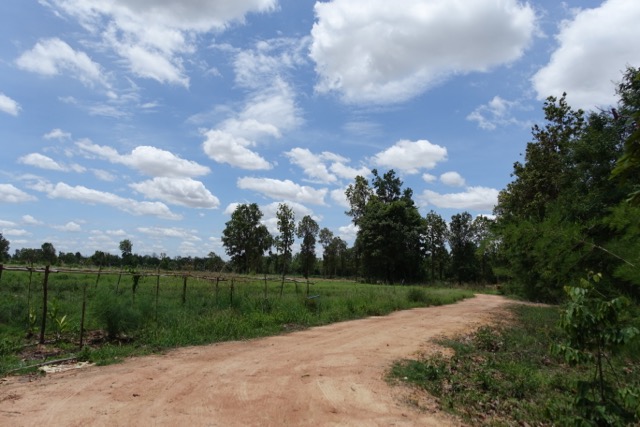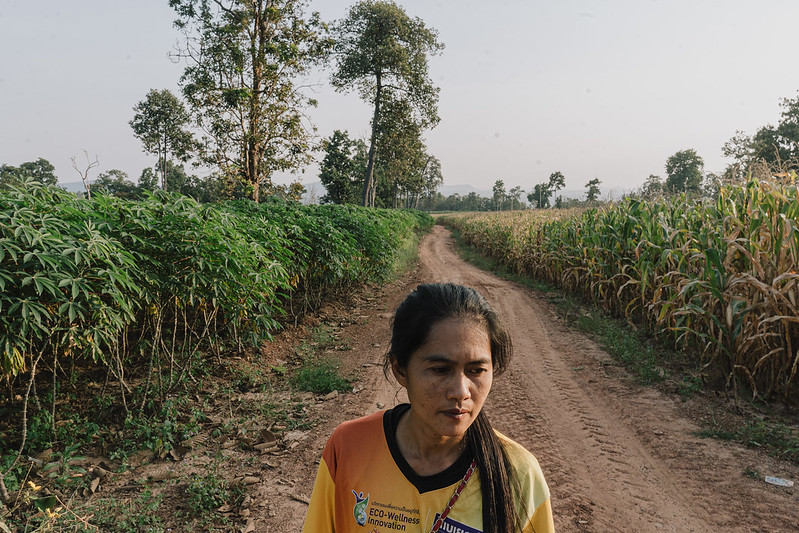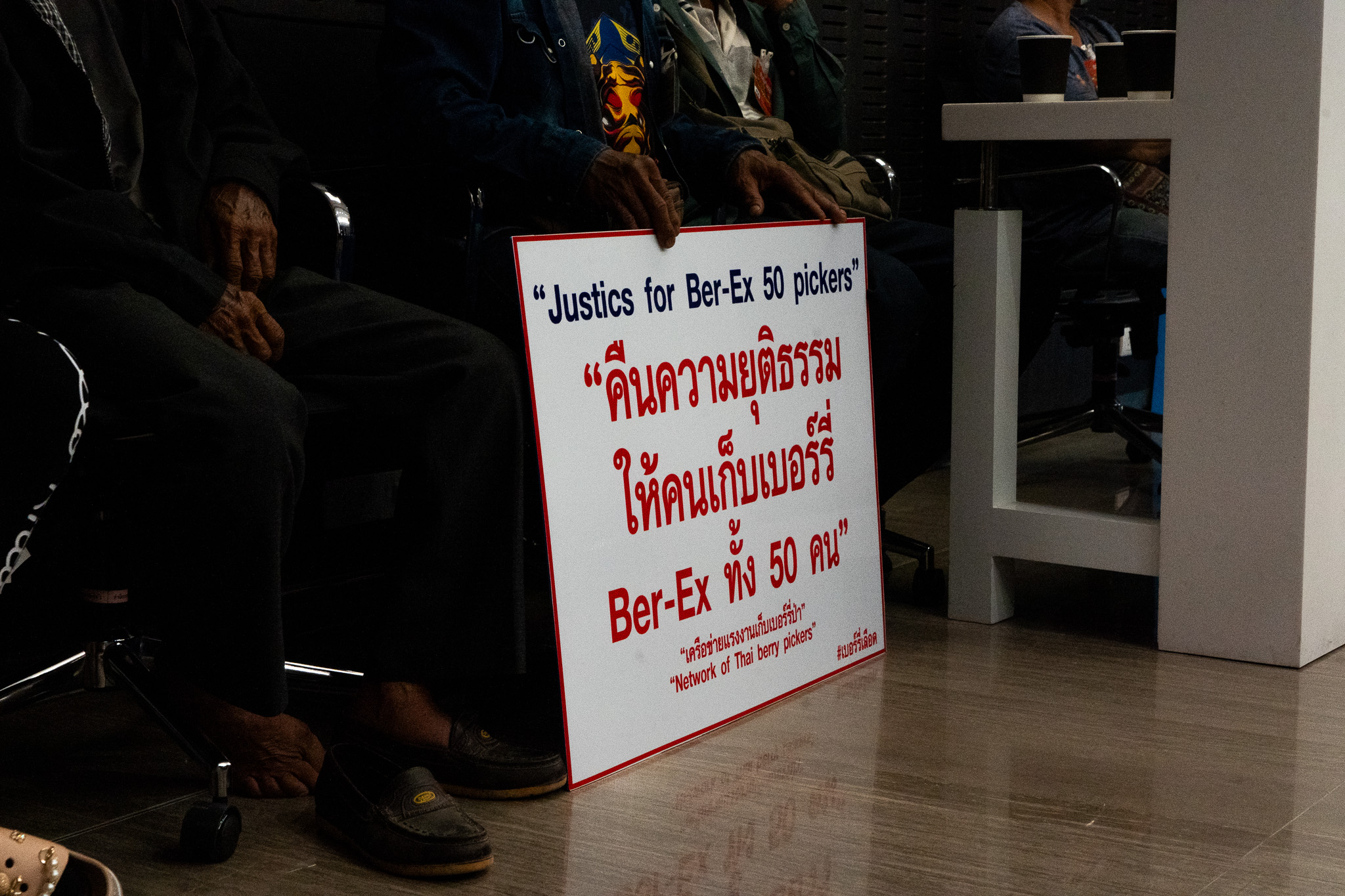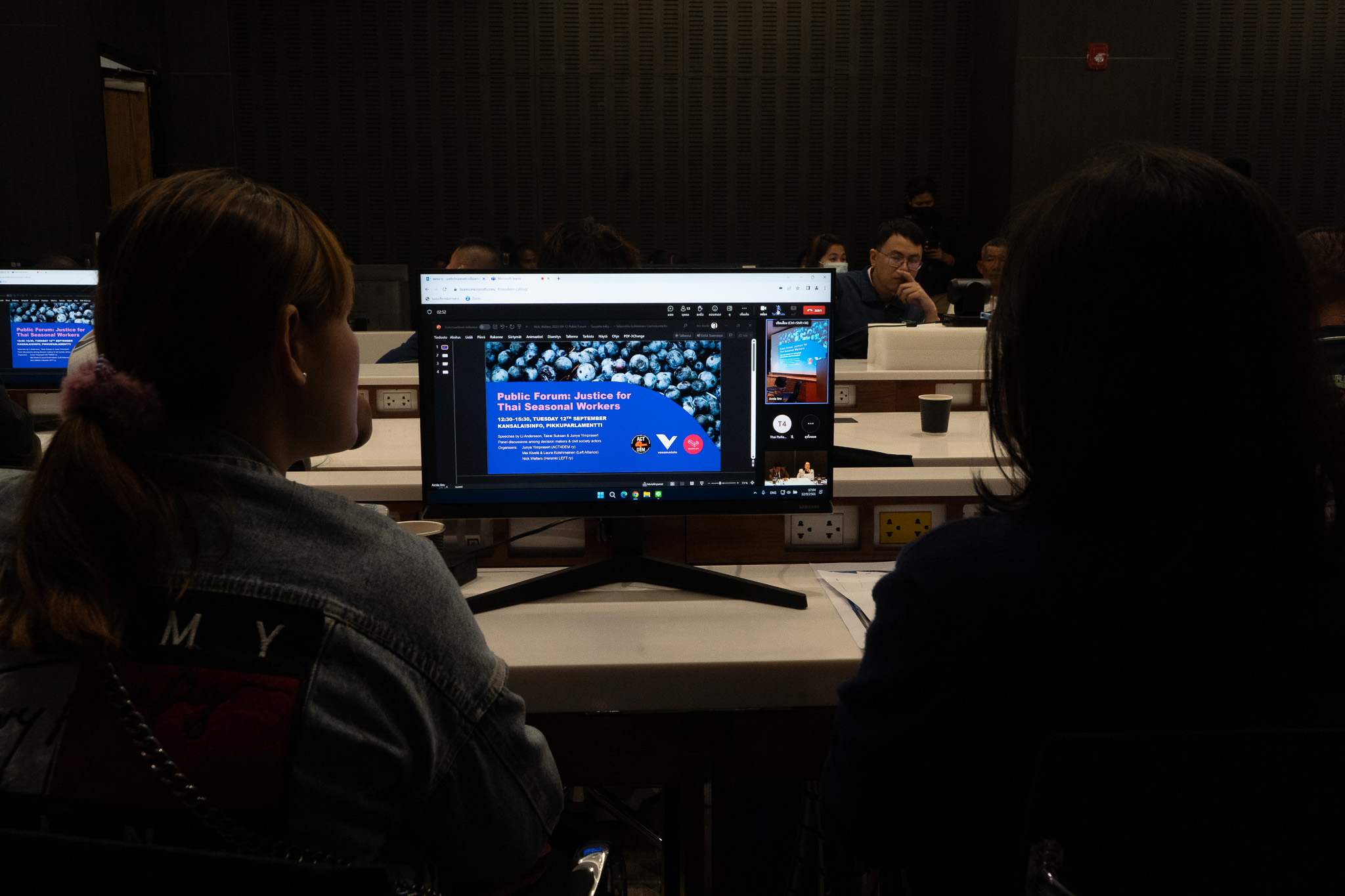By Fabian Drahmoune
Among a wilderness of green shrubbery, Somkit Singsong sat in front of a small clay hut outside his village in Khon Kaen province. Sporting a beard akin to Vietnamese revolutionary leaders, Somkit recounted the days when there was a bounty on his head. “They came for me at the crack of dawn. Helicopters with spotlights hovered over the village. They wanted to kill me,” he said calmly.
From a rural Isaan childhood to student activism in Bangkok and six years with the communist armed struggle, the 65-year-old is now leading a green development project in his Northeastern home. But the life of Somkit will forever be linked to Thailand’s turbulent times of the 1970s.

A child of rural Isaan, Somkit Singsong went to study at Thammsat University in Bangkok, took up student activism, and spent six years in the forest with the communist movement. Today, the 65-year-old is leading a green development project in his Northeastern home.
Somkit’s rural Isaan upbringing distances him from most student activists in 1970s, who tended to come from the urban middle class. Somkit’s university education likewise made him different from most of those Isaan villagers who left their rice fields to fight with the communists during that period.
A prolific writer and co-founder of the Isaan Writers’ Association, Somkit has published several novels, short stories, and poems. Most of his writing belongs to a genre of literature known as wannakam phuea chiwit or “Literature for Life,” which features strong protest themes.
His most famous work remains the words to a song that became the anthem of the political movements of the 1970s. Along with fellow student activist Visa Kanthap, he wrote the lyrics to the song Khon Kap Khwai (“People and Buffalo”) that would later be made famous by Caravan – a folk-rock band that itself grew out of the pro-democracy protests of 1973.
“Every year on October 14, I organize an anniversary event in my home to remember the protests,” said Somkit. “We play ‘People and Buffalo’ because it helps people understand society and has now become part of history itself.”
Village Childhood and City Education
Born into a rice farming family, Somkit spent his childhood in Sap Daeng village, Khon Kaen province. In the early 1960s, he followed a family member to central Thailand to attend middle school on the Thonburi side of the Chao Praya River. Sarit Thanarat – the military dictator who had seized power in 1958 – had just drank himself to death, Somkit remembered.
Somkit shared his high school years with someone who would play a fateful role in Thailand’s politics decades later and pave the way for another military coup. “Suthep Thaugsuban was in the same year. We were friends back then,” he remembered. “After high school, Suthep failed the entrance exam for Thammasat University while I scored as the second best,” Somkit said, with a mischievous grin on his face.
Rewarded with a scholarship from the National Education Council, he enrolled in the newly-established Journalism and Mass Communications program at Thammasat University in 1969. The stipend of 1,500 baht covered his semester tuition fees and bankrolled a comfortable life in Bangkok.
Throughout the 1960s, a military junta had maintained its grip on power and formed an economic and anti-communist partnership with the United States. The Northeast hosted tens of thousands of US military personnel stationed there to support the American proxy war in Vietnam. In return, the US government gave Thailand major financial and development aid.
Bringing Activism to the Countryside
In the late 1960s, resistance to military rule reached a boiling point among university students. In the highly politicized atmosphere at Thammasat University, Somkit formed his own political creed and the sharp-tongued Northeastener soon became a leader among student activists.
“I had the feeling that Thailand was not free, but a colony of America,” Somkit said, explaining his motivation to join the budding student movement. “We talked often about independence and how to end inequalities in Thai society,” he said.
On October 14, 1973 a student-led uprising swept the military rulers out of government and launched a three-year democratic interlude for Thailand. After the unexpected victory, Somkit quit his studies, left the capital and returned to his home in the countryside.
Somkit said he felt frustrated with the attitudes of people in Bangkok. “I had a vision to build the society of my dreams in my home village,” he said, adding that the state gave too little support to the country’s rural population. He began organizing development projects around his village and engaged in politics by joining the central committee of the Socialist Party of Thailand.
“In the countryside, students were seen as the heroes of the time,” he recalled, “so I travelled around and gave speeches explaining politics to villagers.” But hostility against students and progressives was also rising. “The local bureaucrats hated me and called me a national security risk, a traitor, and a communist,” Somkit said grimly.
Into the Arms of the Communists
On October 6, 1976, the military dictatorship regained power with a bloody crackdown on students and protesters at Thammasat University. The shockwaves of the massacre reached Somkit’s village a couple of days later. State and paramilitary forces were hunting down communists and all of those branded “enemies of the state,” and they soon surrounded the area. Left with no other choice, the then-26-year-old fled his home, hiding in the townhouse of a friend until undercover communist agents offered him safe passage to a base in the Dong Mun forest, north of Kalasin province.
Somkit claimed that prior to this he had no connection to the Communist Party of Thailand (CPT), which had launched a guerrilla war against the state from the Northeast in 1965. “The CPT had spies all over Isaan back then, and I realized only later that they had kept an eye on me after I returned from Bangkok,” he said.
Immediately after the massacre of October 6, the CPT invited all dissidents to join the armed revolutionary struggle, accusing the Bangkok establishment and American government of backing the killings. About 3,000 students, leftist intellectuals, and farmer and labour leaders followed the communist call and fled into the forests.
Ironically, it was the state’s anti-communist witch-hunt that drove Somkit into the arms of the communist fighters. He was never one of them, he stressed, but an ardent defender of socialist revolution – a fine distinction that seems to be lost on most people these days, he complained.
Somkit received a warm welcome at the CPT’s base, and his involvement with the Socialist Party led others to regard him as a senior party member. “They treated me with so much respect, but I was really just a boy,” Somkit said.
After the CPT leadership invited Somkit to a major cadre meeting in Laos, he embarked on a weeklong trek to the border, where he was flown by helicopter to Muang Xai in Oudomxay province. “It was pure indulgence,” said Somkit. “There were servants, free cigars, and the fridge was filled with wines from Europe,” he added.
Somkit felt proud to meet high-ranking communist leaders like Udom Srisuwan, the communist party’s major theorist, and Phayom Chulanont, a Thai army defector. (In a historic twist, Phayom’s son would later lead military operations against communist fighters and be appointed Interim Prime Minister under the 2006 military coup.)
Failed Revolution and Finding a New Mission
Somkit never saw much good in the armed struggle and soon felt his work with the CPT was fruitless. He disliked the hierarchical structures of the organization and criticized it for allying with China and adopting a Maoist ideology – a move that would isolate the party from other communist movements in Southeast Asia.
When China’s foreign policy flipped in the late 1970s and the Chinese regime became friendly with the Thai government, the CPT was cut off from the Chinese support that had financed its activities. Soon after, ideological disputes between the party leadership and student activists eventually drove the students to part ways with the communist movement and return to the cities.
Most students abandoned the revolutionary struggle feeling jaded, but Somkit returned to his village hoping to continue where he had left off. He initiated several development and environmental projects and established a publishing house in Sap Daeng village. “The CPT was falling apart, but for me it really all had just started,” he said.
Somkit begrudgingly acknowledges that the experience of the faltering communist revolution and the return of military rule in the 1980s left its mark on his generation of leftists. Many fell into a state of political shock following their return from the forests. While some of them would reemerge in the country’s nascent NGO scene years later, they tended to turn their backs on political organizations, often taking a stance against representative democracy.
After Somkit made rural Isaan the center of his life again, he retreated from politics and turned to environmentalism. Along the way, political disillusionment crept into his life.
Somkit had a final fling with electoral politics as a candidate in a local election, but failed to win. “I didn’t have money to give to anyone – the ones who had cash bought all the votes,” he said. “Maybe it’s for the better; in parliament I might have turned into a bad person.”

The dirt road that leads to Somkit’s environmental development project, which is located a few kilometers outside of his home village Sap Deang in Khon Kaen province.
Scorning Politics, Continuing Activism
A motor scooter came rumbling down the dirt road leading to Somkit’s development project, which lies between two fields far from Sap Daeng village. Somkit’s son climbed off his motor scooter, put down a bag with ice and cheap beer, and disappeared behind the clay hut to prepare lunch. The thirty-something-year-old is taking care of his father, whose health has declined in recent years.
Today, it seems former activist Somkit has not even a glimmer of faith in Thailand’s political development. “If I look at the future of this country, all I see is darkness,” he said. “Just look around you, is there light anywhere here?”
Somkit scorns national politics and while he does not approve of last year’s coup, he calls the current military government “the best of the worst.”
Thai politics has always been a stage “for those who seek benefits and power,” Somkit said, but corruption and nepotism escalated when Thaksin Shinawatra entered the scene.
“Thaksin put the nation on sale and Lee Kuan Yew bought it,” Somkit said, referring to the controversial deal between Thaksin’s family and the Singapore-owned Temasak Holdings in 2006.
The Shinawatra family’s sale of its share in the telecommunications giant Shin Corp to an investment arm of the Singaporean government incited major public outcry over what was regarded as an unfair tax exemption for the powerful family. Thaksin was accused of “selling out” national assets. The controversy surrounding the sale added momentum to the anti-Thaksin protests that precipitated the 2006 military coup.
Somkit also has little respect for the recent political agenda of some fellow student activists from the 1970s. “The radical leftists really thought they could use Thaksin to overthrow the capitalist system and the monarchy,” he said, mentioning two prominent red shirt leaders.
“I was once a socialist and anti-monarchy,” he said, “but then, I realized that there is no other king in this world that is working as hard as ours.” Somkit discovered his love for the country’s royal institution through his newfound passion to defend the environment, a mission that the monarch always supported, he said as his son returned from cooking. The fried cobra dish he served was in no time discovered by hungry red ants.
In a way, history played a joke on many members of Somkit’s generation. Once leaders of the country’s most progressive forces longing to foment a revolution, today many seem stuck without any political vision. And as many political observers have noted, these former student activists today often find themselves cheering those who try to freeze society’s progress.
In Somkit’s view, things are “just different now” and he has moved on from his past of political activism. “The world’s big issues today are environmental,” he claimed. “Political problems make up only a small part of it.”
As Somkit picked a few red ants off some pieces of fried cobra, a construction worker trudged out of the thick green undergrowth to hand Somkit a bill.
Next to the clay hut, Somkit is building an education center for organic agriculture. And the 65-year-old continues to think about new projects that focus on chemical free farming and he vows to fight against the influence of global agribusiness on Thailand’s farmers.
“The farmers are committing suicide by putting chemical fertilizers into their fields,” he said. “What we need is a new Green Revolution.”




